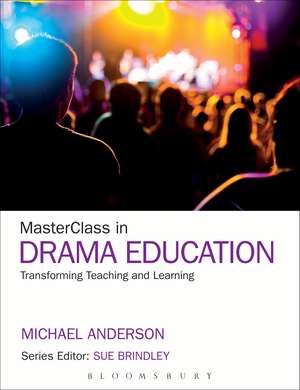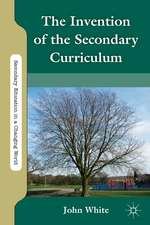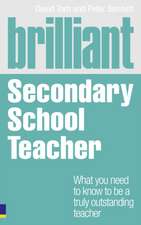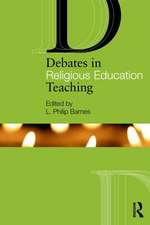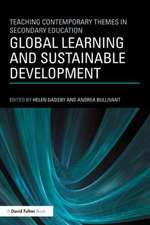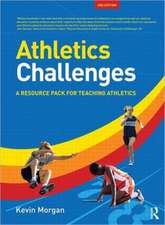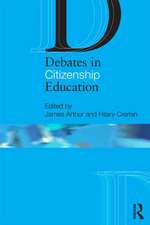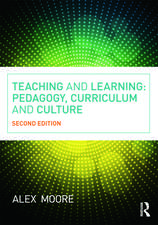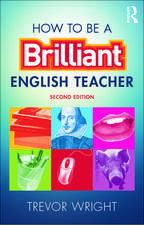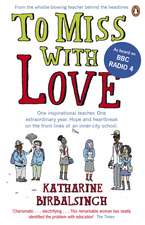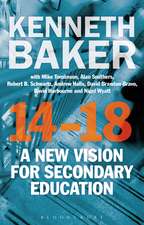MasterClass in Drama Education: Transforming Teaching and Learning: MasterClass
Autor Professor Michael Anderson Sue Brindleyen Limba Engleză Paperback – 30 noi 2011
| Toate formatele și edițiile | Preț | Express |
|---|---|---|
| Paperback (1) | 257.83 lei 6-8 săpt. | |
| Bloomsbury Publishing – 30 noi 2011 | 257.83 lei 6-8 săpt. | |
| Hardback (1) | 831.30 lei 6-8 săpt. | |
| Bloomsbury Publishing – 30 noi 2011 | 831.30 lei 6-8 săpt. |
Preț: 257.83 lei
Preț vechi: 295.76 lei
-13% Nou
Puncte Express: 387
Preț estimativ în valută:
49.34€ • 51.25$ • 40.99£
49.34€ • 51.25$ • 40.99£
Carte tipărită la comandă
Livrare economică 03-17 februarie 25
Preluare comenzi: 021 569.72.76
Specificații
ISBN-13: 9781441185891
ISBN-10: 1441185895
Pagini: 184
Ilustrații: 10
Dimensiuni: 189 x 246 x 13 mm
Greutate: 0.4 kg
Ediția:New.
Editura: Bloomsbury Publishing
Colecția Continuum
Seria MasterClass
Locul publicării:London, United Kingdom
ISBN-10: 1441185895
Pagini: 184
Ilustrații: 10
Dimensiuni: 189 x 246 x 13 mm
Greutate: 0.4 kg
Ediția:New.
Editura: Bloomsbury Publishing
Colecția Continuum
Seria MasterClass
Locul publicării:London, United Kingdom
Caracteristici
Focuses on the skills, knowledge and understanding that post-graduate students will need to develop to inspire and engage a whole new generation of young people and will explore the critical theoretical and practice based perspectives that make for effective drama learning and teaching.
Notă biografică
Michael Anderson is Professor of Education at the University of Sydney, Australia.
Cuprins
Series Editor's Foreword Sue BrindleyAcknowledgementsIntroduction Part I: Drama Education for Generation Next: Foundations for Effective Pedagogy1. Teaching Drama in the Twenty-First Century 2. The Challenge of Technology 3. A History of Drama Education 4. Drama and Aesthetic Education 5. Collaborative Understanding: Ensemble Approaches in Drama Education Part II: Teaching Drama with Generation Next: Pedagogy in Practice6. Planning Drama Learning7. Teaching Knowledge and Skills in Drama Education 8. Assessing Drama Learning 9. Researching Drama Education Epilogue References Index
Recenzii
MasterClass in Drama Education weaves history, practice and research in drama education in a comprehensive, reader friendly and sophisticated manner. Anderson brings breadth as well as depth to drama research and practice, creating a timely book that speaks to scholars and educators. A must-read for all involved in drama/theatre education.
This volume will provide an invaluable guide and overview to those new to, and experienced in, the practice of drama teaching, and particularly those beginning research in the area. Anderson successfully manages to weave a narrative that is always engaging and accessible, and he skilfully contextualises both the positioning and key issues of drama education. He directly addresses some of the important challenges facing the community, and seamlessly mainstreams some of the heretofore somewhat peripheral discussions around aesthetics, drama knowledge, creativity and technology. In identifying five guiding principles for the future of drama education at the outset, Anderson puts his own stamp on this work and makes clear his views for the future of drama education. However, he doesn't burden the reader with solely his own philosophy and is generous in acknowledging the contribution of others as well as the lacunae in our collective knowledge and wisdom.
MasterClass in Drama Education provides an excellent insight into teaching drama in the twenty-first century. It considers the challenges and offers pragmatic solutions for educating the young people of today who face an unknown and unimaginable future. This text looks back over the history of drama education with a superb summary of the field to date, comprehensively covering the development of the field with references to practitioners and academics in Australia, America, Canada and the UK. In part two, Anderson discusses drama as a productive pedagogy for democratic learning in a long overdue reconsideration of both the aesthetics and power of drama in the classroom. This text is a significant addition to the literature of drama education both for experienced teachers and those new to the field.
Anderson wears his teacher/learner credentials on his sleeve, often recounting his own student and teacher experiences. He communicates with an accessible written style, informed and engaging.
This volume will provide an invaluable guide and overview to those new to, and experienced in, the practice of drama teaching, and particularly those beginning research in the area. Anderson successfully manages to weave a narrative that is always engaging and accessible, and he skilfully contextualises both the positioning and key issues of drama education. He directly addresses some of the important challenges facing the community, and seamlessly mainstreams some of the heretofore somewhat peripheral discussions around aesthetics, drama knowledge, creativity and technology. In identifying five guiding principles for the future of drama education at the outset, Anderson puts his own stamp on this work and makes clear his views for the future of drama education. However, he doesn't burden the reader with solely his own philosophy and is generous in acknowledging the contribution of others as well as the lacunae in our collective knowledge and wisdom.
MasterClass in Drama Education provides an excellent insight into teaching drama in the twenty-first century. It considers the challenges and offers pragmatic solutions for educating the young people of today who face an unknown and unimaginable future. This text looks back over the history of drama education with a superb summary of the field to date, comprehensively covering the development of the field with references to practitioners and academics in Australia, America, Canada and the UK. In part two, Anderson discusses drama as a productive pedagogy for democratic learning in a long overdue reconsideration of both the aesthetics and power of drama in the classroom. This text is a significant addition to the literature of drama education both for experienced teachers and those new to the field.
Anderson wears his teacher/learner credentials on his sleeve, often recounting his own student and teacher experiences. He communicates with an accessible written style, informed and engaging.
